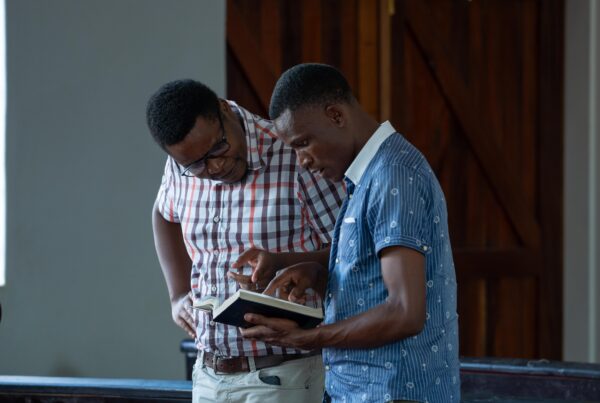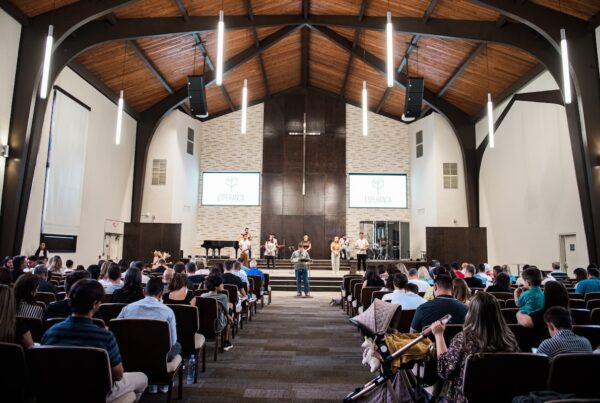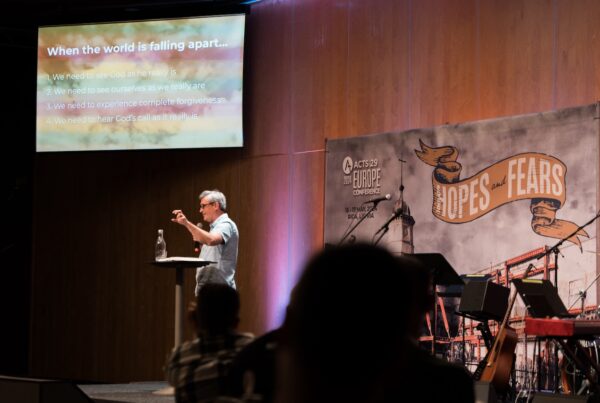What’s your knee-jerk reaction to frustrations and hardships? When things don’t happen as planned, I think we tend to default to three responses. First, misdirection—we fill our schedules and lives to the brim so we never have to deal with the pain. Second, minimization—we tell ourselves, No worries . . . it doesn’t matter . . . it’s fine. And finally, medication—we fill ourselves with chocolate or alcohol or binge-watch Netflix.
And yet the Bible gives us a better option: We can go to God with our lament, crying out to the Father of all comforts, and trust him to save us.Our pain is not the end of the story. Click To Tweet
Many have found the Psalms—particularly the psalms of lament—a beautiful way to give voice to our pain, perhaps especially as we’ve sought to deal with the current Covid crisis in a healthy way. When we come to Psalms 42 and 43 and listen to the Sons of Korah amid the raw whiplash of their emotional mountains and valleys, we notice both their relevance to our current situation and also the guidance they give about responding healthily to it.
Why Are You Cast Down, O My Soul?
I think there are four main (and relatable) reasons why the Psalmist is in such pain.
1. He’s far from home. There’s distance between him and where he wants to be—with God and his people (Ps. 42:6). He asks, “When can I go and meet with God?” (Ps. 42:2). It’s not quite the same for us under the new covenant, but being unable to gather as we’d like during Covid, his struggles resonate.
2. He’s in the firing line. There are opponents piling up insults against him (Ps. 42:3; 42:10). We also know the reality of dealing with opposition. Isn’t the division and disunity exhausting, when voices from both inside and outside the people of God seek to do damage?
3. He misses the festivals. He remembers how he used to be able to meet with God’s people in God’s presence (Ps. 42:4). This could be both a blessing—it’s good to remember better times, and a curse—it hurts to remember what we’re missing.
4. He feels forgotten. He’s painfully honest, even explicit, about feeling forgotten by God: “I say to God my rock, ‘Why have you forgotten me?’” (Ps. 42:9).
Over the last year, each of these have resonated with me. Maybe you feel that, too? But the danger is that we’re not good at dealing with pain. If you’re anything like me, we’re far more likely to misdirect, minimize, or medicate than take our pain to the Lord.
So how can these psalms help us—both personally and as we seek to lead our churches to emotionally and spiritually process pain? There are two vital ingredients: They teach us to speak to God and to speak to ourselves.The Psalms don’t just speak to us, they speak for us. They’re words from God to help us verbalize the life of faith. Click To Tweet
Speak to God
As Athanasius said, the Psalms don’t just speak to us, they speak for us. They’re words from God to help us verbalize the life of faith. God himself gives us the words to say to him when life is hard.
Have you cried out to God in the last year? The Sons of Korah first cry to God in the pain of lament (see, for example, Ps. 42:9 and 43:3) and then cry to him for relief (43:3). It’s good to do both. I wonder if many of us quickly cry out for relief but hesitate to cry out in lament? It’s also striking that the Psalmist cries first for God’s presence (42:1) before asking God to deal with his pain. Do we also want the Giver more than the gifts he gives?
Speak to Yourself
As well as speaking to God, the Psalmist famously speaks to himself in these verses. The refrain in Psalms 42:5, 42:11, and 43:5 sees the suffering Psalmist asking himself some stern questions:
“Why are you cast down, O my soul, and why are you in turmoil within me? Hope in God; for I shall again praise him, my salvation and my God.”
We so often believe what we feel, but at times we ought to mistrust our emotions and put our hope in God. How good are we at doing that? How much do we encourage our churches to do that? As Paul Tripp puts it, “No one is more influential in your life than you are, because no one talks to you more than you do.” The reality of the Psalmist’s hope comes from what he knows of God. He remembers who God is—and specifically—that God is in the business of saving.
Fast forward a few hundred years and we meet a man in a garden, crying out to God amid unbearable pain. His opponents are cruelly mocking him, and in his body he’s about to be far from his Father in heaven.
This One was cut off and distanced from his Father so even when we might feel distant from God, in Jesus, we never will be. Go to him and take your people to him. Our pain is not the end of the story. That’s true in the narrative of the Psalms but also in the bigger picture of the Bible—our salvation and our eternal, pain-free hope is fulfilled in Christ.










